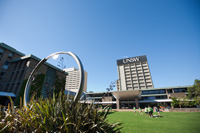This is a shelf course. A shelf course comprises a number of modules related to this broad area of study. Each module is a separate semester of study in this area and is offered in rotation. You can study TWO modules but you cannot study the same module twice.
|
Subject Area: History
Module: "Religion and Secularism 1700-" (Semester 2, 2011)
One of the ways in which modernism, and the Enlightenment heritage it embodies, has been commonly understood is as a process that involves a progressive secularisation of belief and practice. The object of this course is to examine such a view using historical case studies from the ‘Old World’ of Europe and the ‘New Worlds’ of North America and Australasia. The starting point is the way in which the Enlightenment shaped the defining eighteenth-century mould of the New Worlds as well as calling into question that traditional fusion between Church and State long known as Christendom. After considering the ramifications of these movements, the course will conclude with a discussion of the continuing impact of such historical forces in shaping the role of religion in the public realm in Europe, Australia and the United States particularly in view of the increasing religious pluralism of such societies.
Module: "The Holocaust since 1945" (Semester 1, 2011)
Since the horrors of the Nazi extermination camps were made known to the world after the end of World War II, the Holocaust has been constantly replayed in the human imagination. Does an event such as this one stop being relevant at some point? How do nations deal with a difficult past? How do we make use of history? In this course, we explore the way the Holocaust has been politicised since 1945, including war crimes trials, Holocaust revisionism, the Holocaust and anti-Zionism, the way certain European nations have dealt with their collaborationist past and the issue of restitution of assets to Holocaust survivors.
Module: "Islamic Worlds: From Spain to Indonesia"
The “clash of civilizations” appears to be a dominant theme in the post-Cold War world. This course has a broad geographical scope and long chronological dimension. It is comparative. Topics include: forms of Islamic government; nationalism and participation in a global Muslim community; Islam as a world system; Islamic forms of art and architecture; the impact of printing on 19th century Muslim communities; and themes of modernisation versus westernisation. Emphasis will be given to Asian Islam, especially to Indonesia, which is the world's largest Muslim country and Australia's most important neighbour.

